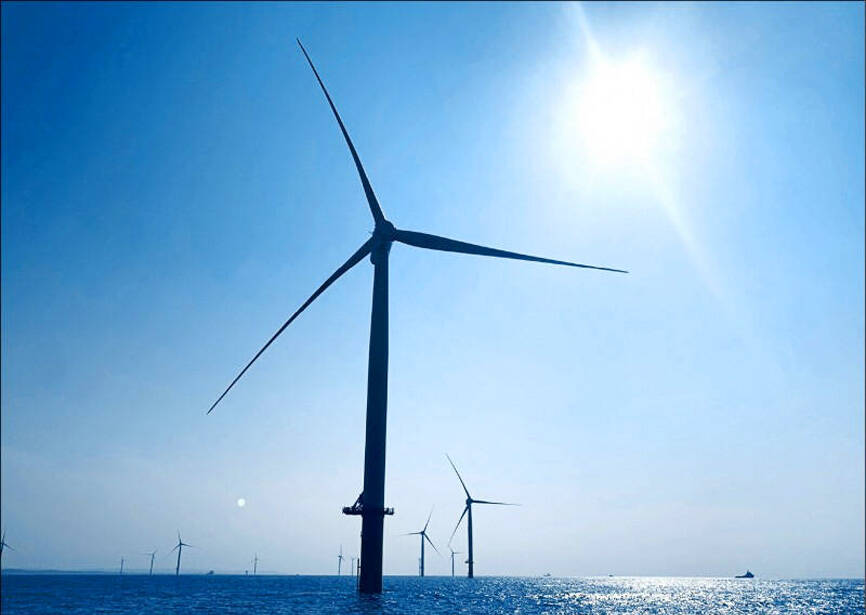Six offshore wind power developers, including Copenhagen Infrastructure Partners K/S (CIP) and Corio Generation, have won the bid to develop 3 gigawatts of wind energy for connection to the grid in 2026-2027, the Ministry of Economic Affairs said yesterday.
The four other winners are Northland Power Inc (北陸能源), Synera Renewable Energy Co (風睿能源), Taiya Renewable Energy Co (台亞風能) and Skyborn Renewable Taiwan Co (天豐新能源).
Together, the six companies are to erect wind turbines in the new development zone off Changhua County and Miaoli County. That would create 10 new wind farms, the ministry said.

Photo: Lin Jing-hua, Taipei Times
Each company would be granted up to 600 megawatts (MW) in capacity, the ministry said, adding that details about the distribution of the wind farms would be finalized by the end of this year.
Orsted A/S withdrew from the auction on the Sept. 30 deadline, citing high inflation and rising interest rates. The company is the largest shareholder of Taiwan’s first commercial-scale offshore wind project, Formosa 1, whose capacity was extended from 8MW to 128MW in 2019.
The auction is the first part of three actions under plan as the country enters the third phase of its wind power development project, the ministry said.
That means Taiwan has formally entered a stable and healthy stage of wind power development through the release of new wind power development zones each year, it said.
Next year, the ministry plans to auction another 3 gigawatts of capacity for new offshore wind farms and another 3 gigawatts are to be developed in 2024.
Taiwan began exploring wind energy in 2012 by launching pilot projects, and wind turbines were deployed from 2017.
Asked about the “slow progress” in deploying offshore wind power, the Bureau of Energy attributed it to strong ocean currents, unfavorable weather and a labor shortage this year.
Nonetheless, about 190 wind turbines have been erected this year, close to its annual target of 200, it said.
Offshore wind power is one of its 12 major strategies in developing clean energy, the bureau said, adding that solar power is another key green energy source for Taiwan to reach its goal of making renewable energy account for 15 percent of overall electricity generation by 2025.

RECYCLE: Taiwan would aid manufacturers in refining rare earths from discarded appliances, which would fit the nation’s circular economy goals, minister Kung said Taiwan would work with the US and Japan on a proposed cooperation initiative in response to Beijing’s newly announced rare earth export curbs, Minister of Economic Affairs Kung Ming-hsin (龔明鑫) said yesterday. China last week announced new restrictions requiring companies to obtain export licenses if their products contain more than 0.1 percent of Chinese-origin rare earths by value. US Secretary of the Treasury Scott Bessent on Wednesday responded by saying that Beijing was “unreliable” in its rare earths exports, adding that the US would “neither be commanded, nor controlled” by China, several media outlets reported. Japanese Minister of Finance Katsunobu Kato yesterday also

Taiwan’s rapidly aging population is fueling a sharp increase in homes occupied solely by elderly people, a trend that is reshaping the nation’s housing market and social fabric, real-estate brokers said yesterday. About 850,000 residences were occupied by elderly people in the first quarter, including 655,000 that housed only one resident, the Ministry of the Interior said. The figures have nearly doubled from a decade earlier, Great Home Realty Co (大家房屋) said, as people aged 65 and older now make up 20.8 percent of the population. “The so-called silver tsunami represents more than just a demographic shift — it could fundamentally redefine the

China Airlines Ltd (CAL, 中華航空) said it expects peak season effects in the fourth quarter to continue to boost demand for passenger flights and cargo services, after reporting its second-highest-ever September sales on Monday. The carrier said it posted NT$15.88 billion (US$517 million) in consolidated sales last month, trailing only September last year’s NT$16.01 billion. Last month, CAL generated NT$8.77 billion from its passenger flights and NT$5.37 billion from cargo services, it said. In the first nine months of this year, the carrier posted NT$154.93 billion in cumulative sales, up 2.62 percent from a year earlier, marking the second-highest level for the January-September

‘DRAMATIC AND POSITIVE’: AI growth would be better than it previously forecast and would stay robust even if the Chinese market became inaccessible for customers, it said Taiwan Semiconductor Manufacturing Co (TSMC, 台積電) yesterday raised its full-year revenue growth outlook after posting record profit for last quarter, despite growing market concern about an artificial intelligence (AI) bubble. The company said it expects revenue to expand about 35 percent year-on-year, driven mainly by faster-than-expected demand for leading-edge chips for AI applications. The world’s biggest contract chipmaker in July projected that revenue this year would expand about 30 percent in US dollar terms. The company also slightly hiked its capital expenditure for this year to US$40 billion to US$42 billion, compared with US$38 billion to US$42 billion it set previously. “AI demand actually